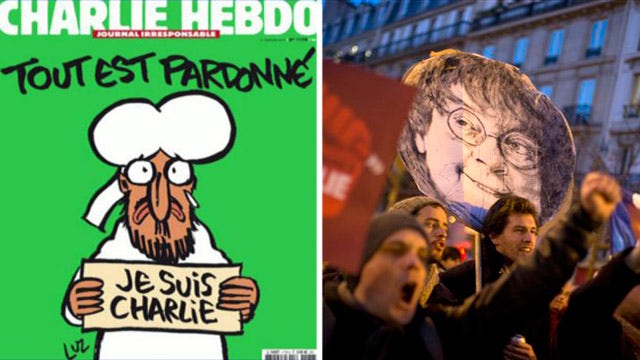Charlie Hebdo returns with defiant cover
French satirical magazine's first issue since terror attack depicts Muslim prophet Muhammad
A controversial French magazine’s cartoons are once again prompting cries of “blasphemy,” though the critiques are coming from an unlikely source: the Russian government.
Charlie Hebdo’s drawings of a Russian plane crash that killed 224 on Oct. 31 – an apparent act of terrorism – have been called “pure blasphemy” by Dmitry Peskov, a spokesman for President Vladimir Putin.
“This has nothing to do with democracy, self-expression or whatever,” Peskov said, according to the New York Post. Several other Russian officials echoed the tenor of the comments.
“This has nothing to do with democracy, self-expression or whatever"
Charlie Hebdo has generally been open to mocking all political, cultural and religious figures. Its practice of pressing the boundaries of socially-acceptable parody and taste, however, has led to tragedy. Illustrations of one of Charlie Hebdo’s most visible past targets, the Islamic prophet Muhammad, inspired terrorists to stage a deadly terrorist attack on the magazine’s headquarters in January.
In one of the most recent cartoons to generate outrage, a black-and-white illustration shows an ISIS fighter covering his head as plane and body parts fall from the sky. A caption above the image reads: “The Islamic State: Russian aviation intensifies its bombardments.”
Another cartoon is a full color drawing of a skull lying on the ground, with a dislocated eye fallen to one side and the burning fuselage of a plane in the background. The caption reads: “The dangers of Russian low-cost airlines.” A word bubble emanating from the skull declares, “I should’ve flown Air Cocaine.”
Charlie Hebdo editor Gerard Briard didn’t seem to be affected by the Russian condemnation.
“We are a secular, democratic and atheist newspaper,” he told a French radio station, according to The Moscow Times. “The term blasphemy has no meaning for us.”

